Why Saudi-Israel ‘Peace’ Will Cement a Violent Future
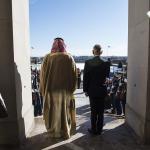
There has been a great deal of excitement in American and Israeli media as of late, with rumors that a normalization agreement between Israel and Saudi Arabia is imminent. High-profile visits from U.S. officials with the Saudi Crown Prince, Mohammad Bin Salman, have been reported on breathlessly, as pundits write endless op-eds about how normalization with one of the most powerful Arab countries would be transformative for the region, for the two-state solution, and for “peace.”
Analysts have also speculated on the benefits of such a diplomatic achievement for President Joe Biden, both in his foreign policy objectives and in his ongoing re-election campaign. The importance of the Abraham Accords to the entire U.S. establishment — despite being facilitated by the Trump administration — was on full display in June, when the House of Representatives voted overwhelmingly to create a special envoy position tasked with expanding the accords, with Saudi Arabia at the forefront of their mission.
Much of this hoopla, however, is likely over exaggerated. As one analyst described, a good deal of these maneuvers, and much of the reporting on them, can be characterized as “strategic speculation;” they are intended to inflate the possible expansion of the Abraham Accords and similar initiatives, so as to pressure various actors to continue pursuing the process. In other words, they are more about optics than they are about reality — a reality where signatory governments, and their citizens, are actually tiring of Israel’s increasingly far-right policies.
Nevertheless, whatever the outcome, the concerted effort at expanding regional normalization tells us a great deal about how the Americans, Israelis, and their Arab allies envision the foreseeable future, both for Palestinians and the broader Arab world.
How to understand normalization
In the diplomatic realm, normalization can be defined as the increase of any political, cultural, trade, and military ties, overt or covert. Official peace agreements are one manifestation of these ties, and they certainly increase the scope and breadth of relations. However, they are not the norm across the Middle East, and the Gulf in particular. Instead, most Arab governments, including Saudi Arabia, have had varying degrees of under-the-table normalization, particularly when it comes to Israel.
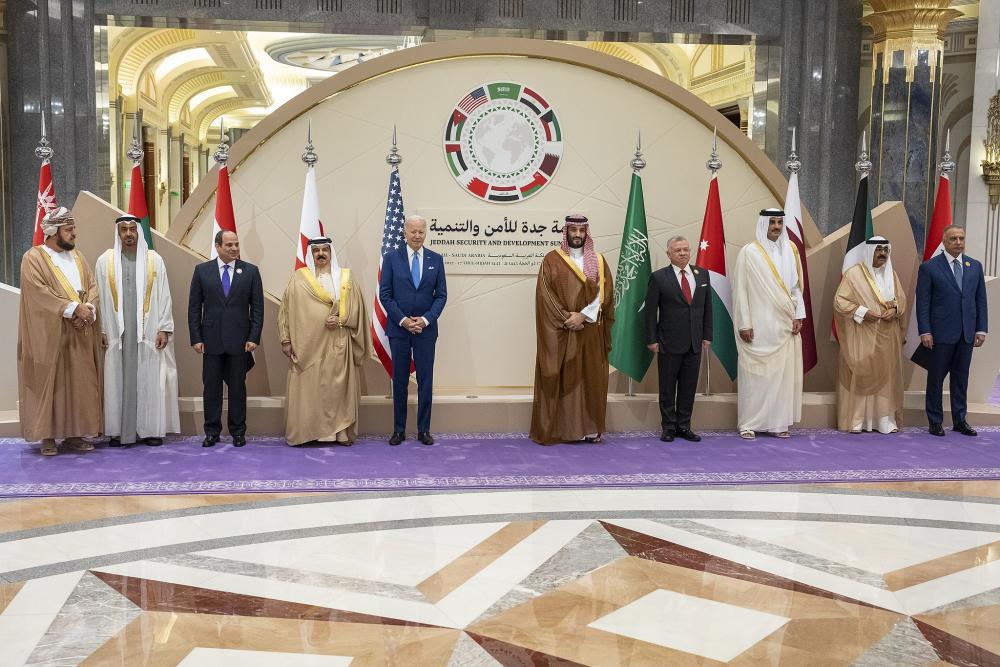
President Joe Biden stands beside leaders of the GCC, Egypt, Iraq, and Jordan at the Jeddah Security and Development Summit, Saudi Arabia, July 17, 2022. (The White House)
In recent years, unofficial Saudi-Israeli ties have increased, with high-profile visits from Saudi officials to Jerusalem, the steady increase of Israeli visits to the kingdom, and leaks to the media about Riyadh’s openness to pursue greater connections with America’s other main ally in the region.
When the UAE and Bahrain, and later Morocco and Sudan, became signatories to the Abraham Accords in 2020 and after, they claimed that the objective of these steps was to pursue “peace.” Similarly, when the Saudi regime was courting the Trump administration by showing support for Jared Kushner’s grand plans for “solving” the Israeli-Palestinian conflict, talk of increased normalization went hand in hand with half-baked ideas about a final Palestinian-Israeli agreement. For instance, Saudi officials infamously signaled during this time that Riyadh would support the idea of Abu Dis — an economically depressed suburb of occupied East Jerusalem — serving as the Palestinian state’s new capital.
But in reality, this talk of peace is merely a fig leaf to normalization’s actual objective and function. These agreements do not resolve underlying causes of conflict, but rather cement an increasingly violent status quo.
While they do formalize bilateral connections between Israel and Arab states, thereby increasing coordination and decreasing likelihood of conflict between them, these “peace” deals can only be characterized as illiberal, functioning as a form of authoritarian conflict management. This is a term from political science literature entailing an approach that “eschew(s) genuine negotiations among parties to the conflict, reject(s) international mediation and constraints on the use of force, disregard(s) calls to address underlying structural causes of conflict, and instead relies on instruments of state coercion and hierarchical structures of power.”
If viewed from this perspective, then the objectives of all parties — American, Israeli, and Saudi — become more clear. The United States is not pursuing normalization because it is a foreign policy win for Biden; indeed, the degree to which foreign policy matters to American voters has long been a question up for debate. Rather, the Biden administration wants to buy time for Israel — even as public opinion turns against it — to maintain the status quo of a moribund peace process that has only increased the degree to which Palestinians are repressed and displaced.
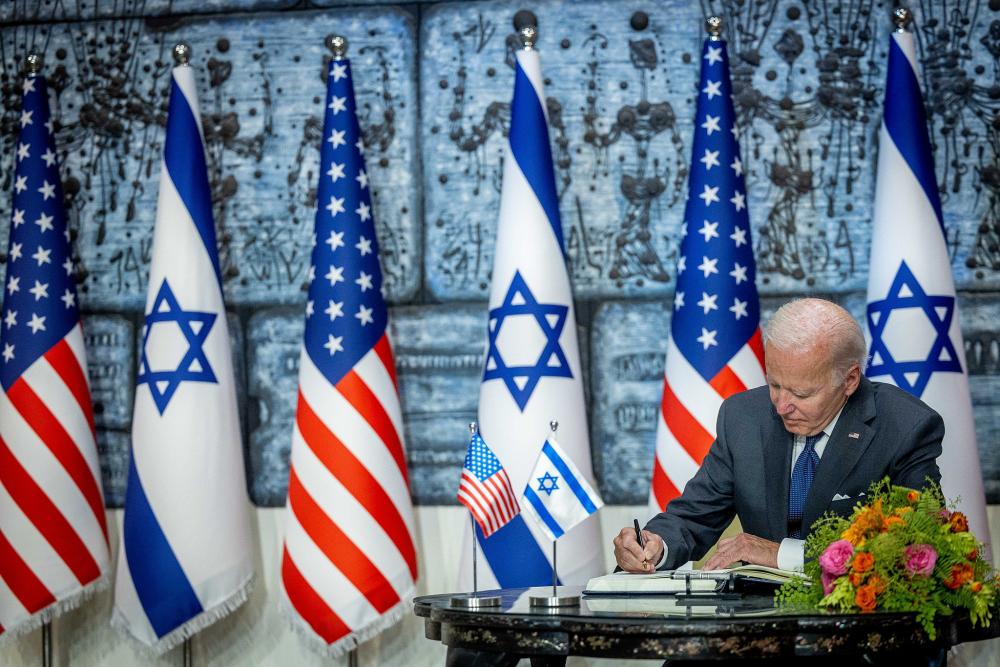
U.S. President Joe Biden visits the Israeli President’s Residence in Jerusalem, July 14, 2022. (Yonatan Sindel/Flash90)
Even as reputable scholars, human rights organizations, and activists point out that the current peace process and objective of a two-state solution are no longer viable, American officials continue to pursue this impossible outcome. As a recent interview with New York Times columnist Thomas Friedman put plainly: the Americans have to keep “pretending” that a two-state solution is possible or “insure that it never came back.” So for the U.S. government, a normalization deal which pays lip service to the Palestinian cause would help keep this charade going, despite the authoritarian conditions under which Palestinians live.
Similarly, the Israelis want to deepen their alliances with regional autocrats to further solidify a status quo that sees no Palestinian state, let alone sovereignty of any kind. Regional alliances would ensure that Israel never has to address the underlying cause of conflict: the Nakba and ongoing Palestinian dispossession. Indeed, as Israel becomes more integrated in the region despite its escalating crimes, there is clearly no incentive for it to change its course.
Instead, by pursuing normalization, Israelis will acquire greater impunity, further partnerships to offset security threats (especially from Iran), as well as a way to undermine mass public support for Palestinians in the region as seen in the past. Moreover, given the defense industry’s centrality to the Israeli economy, finding new markets for repressive weapons and surveillance technologies is always an added bonus.
What do the Saudis get out of this?
The Saudi government has increasingly utilized security technologies — from Israeli and other sources — and has become more proactive in expanding its repressive capacity. This is an open secret: as my own research shows, in the wake of the Abraham Accords, we have seen a ratcheting up of repression in all the signatory countries and even their close allies. For example, after the UAE and Bahrain signed agreements with Israel, Saudi media was quick to make clear that its citizens should not criticize the “sovereign” decisions of other countries that normalize. A number of Saudi elites tied to the state establishment publicly declared their support for the UAE’s peace agreement with Israel, and similar slogans were used by Emirati social media influencers.
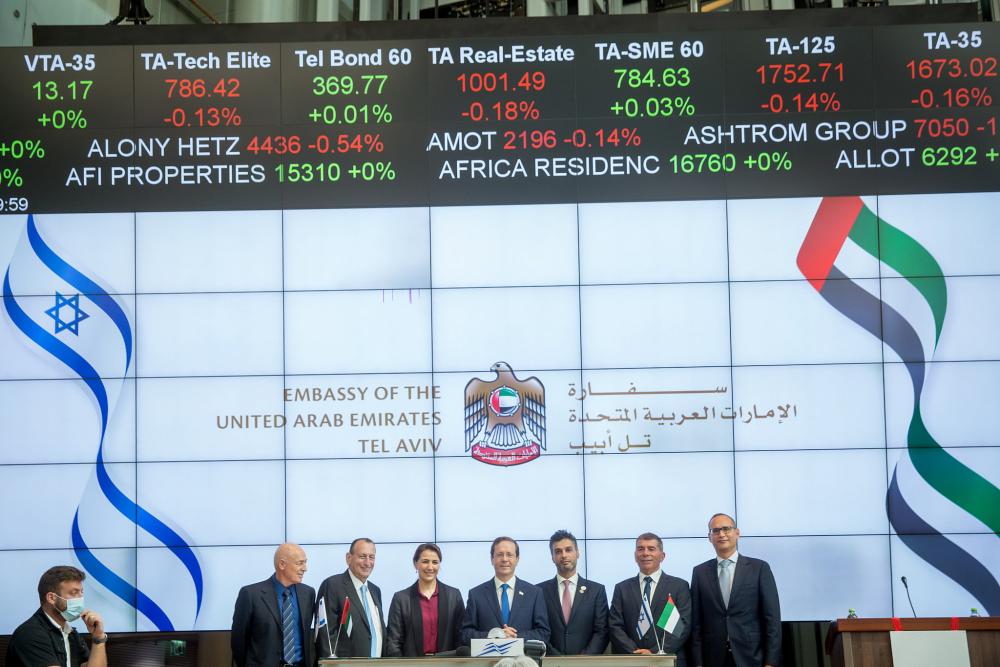
UAE Ambassador to Israel Mohamed Al Khaja and Israeli President Isaac Herzog at the opening ceremony of the United Arab Emirates embassy in Tel Aviv, July 14, 2021. (Miriam Alster/Flash90)
It is clear that for Saudi Arabia, like other Arab regimes, normalization with Israel presents an opportunity to advance greater social control. This becomes more evident when we consider the central role pro-Palestine activism plays in regional dissent, as well as the overwhelming level of support for the Palestinian cause among Arab populations.
Historically, Palestine has been one of the few topics around which Saudi citizens are allowed to mobilize. Indeed, Saudis have a history of protest in support of the Palestinian cause, beginning as early as the 1920s. This continued throughout the 1930s and ‘40s in support of the Arab revolt in Palestine and in opposition to the partition of the country. The Palestinian cause also spurred the creation of Saudi “popular action committees,” in order to gather financial support from within the kingdom. The current king, Salman bin Abdulaziz Al Saud, personally oversaw the fundraising committee for Palestine within the Saudi government during his time as emir.
Evidence of pro-Palestinian sentiment among Saudi citizens remains present to this day, with Saudis often breaking taboos for the sake of the Palestinian cause. According to an interview with a Saudi activist, after the 2011 Arab Spring, there was a proliferation of pan-Gulf organizations with a pro-Palestine outlook, such as Multaqa al-Tawaasul (“Communication Forum”) and Multaqa al-Nahda al-Shababi (“Youth Renaissance Forum”), in which Saudis actively participated.
In recent years, and in response to the Abraham Accords, Saudi activists have also become involved in the group “Gulf Coalition Against Normalization.” This involvement has been on an individual basis, with most of those participating living outside of Saudi Arabia. Given restrictions on political organizing, no civil society group from within the country has been able to take part in this initiative.
Polling confirms that pro-Palestinian sentiment is widespread. Results of the latest Arab Opinion Index show how, when asked whether they agreed with the sentiment that “the Palestinian cause is a cause for all Arabs, and not just Palestinians alone,” only 12 percent of Saudi respondents disagreed. Similarly, when asked about whether they supported their government officially recognizing the state of Israel, only 5 percent of Saudis agreed, with a huge non-response rate of 57 percent — implying fear of answering freely. Pro-Palestinian sentiment in Saudi Arabia has been consistent since the beginning of polling efforts in 2011, and there is a high level of public disagreement with normalization.
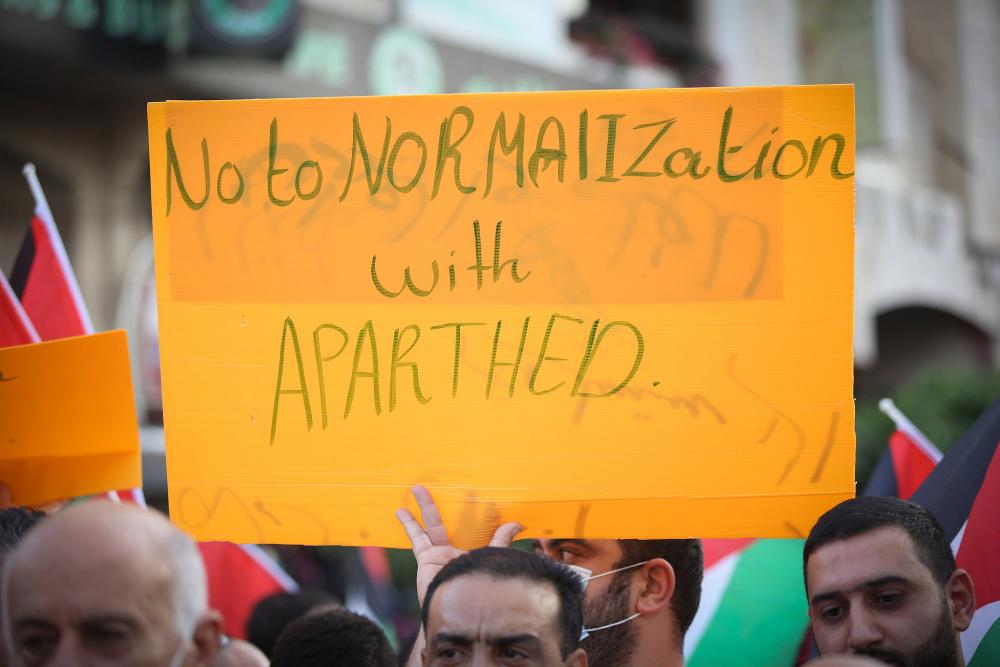
Palestinians protest against an agreement to establish diplomatic ties between Israel and the United Arab Emirates, in the West Bank city of Ramallah, September 15, 2020. (Flash90)
Clamping down on all this potential political opposition is thus a benefit of pursuing normalization, especially when increased ties means greater access to Israeli repressive technologies that can help facilitate this goal.
Furthermore, the Saudi regime benefits from integrating itself into U.S. foreign policy, which has long been predicated on the idea of authoritarian conflict management in the Arab world. By agreeing to a deal with Israel, the key American ally in the region, the Saudis can leverage their position more effectively in the future, and attain American concessions. All the Saudi government has to do is claim that they want to stop the annexation of the West Bank (a de facto reality for decades) in order to reap the benefits to their regime’s longevity and centrality in the region.
Injustice has consequences
To be clear, the Saudis have claimed that for official normalization with Israel to move forward, they must receive a NATO-like defense pact, nuclear proliferation technologies, and an official halt to West Bank annexation. It is unlikely that the Biden administration can meet all these demands, but will likely settle for deeper ties with less-than-official normalization. Nevertheless, research has shown that monarchical regimes utilize informal agreements more regularly than official ones, gradually formalizing these arrangements over time. Thus even small steps toward normalization can still mean the intensification of authoritarian processes, adding fuel to an Arab world already on fire.
As such, Saudi-Israeli normalization will hardly bolster peace or stability. Instead, it will serve as another pillar of a regional architecture that sees no priority for justice in the Arab world and its peoples. Such an agreement will hasten the suffocation and ever more likely mass displacement of Palestinians, who will have no recourse on the international stage. Saudi activists and citizens will face the brunt of the inevitable increase in repression that comes in the wake of such “peace.” And given the way that regimes employ their methods transnationally, this repression will surely travel. As history shows, the arm of authoritarian regimes is long, and very rarely held to account.
The U.S. establishment has therefore written off a sustainable future, hoping instead to manage instability with autocratic allies and false peace predicated on oppression. One wonders what it will take for policymakers in Washington, a decade after the Arab Spring, to finally learn the lesson that injustice has consequences.
Dana El Kurd is an assistant professor at the University of Richmond and a senior nonresident fellow at the Arab Center Washington. She is the author of "Polarized and Demobilized: Legacies of Authoritarianism in Palestine."
Support journalism against apartheid. Become a member of +972 Magazine. We rely on YOUR contribution to expose and resist injustice in Israel-Palestine.
